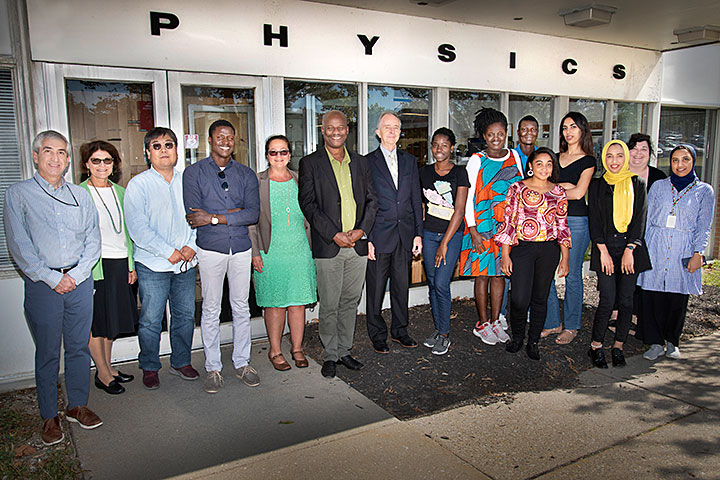Alumni from African School of Physics Come to Brookhaven Lab for Hands-on Work Experience
October 8, 2019
 enlarge
enlarge
With funding from the Lab's High-Energy Physics directorate, nine alumni from the African School of Physics (ASP) were able to travel to Brookhaven National Laboratory to pursue projects consistent with their academic research. Pictured in this photo with Associate Lab Director for Nuclear & Particle Physics, Berndt Mueller, are ASP participants, administrative staff, and some of the Lab mentors. From left: Hooman Davoudiasl, Linda Feierabend, Dohyun Kim, Diallo Boye, Cathy Cutler, Ketevi Assamagan, Berndt Mueller, Jesutofunmi Fajemisin, Somiealo Azote, Yves Kini, Christelle Ekosso, Hassnae El Jarrari, Mounia Laassiri, Nicole Kelly and Heba Sami Abdulrahim. Missing from the photo are mentors, Mary Bishai, Milind Diwan, Eric Lançon, Lisa Miller, and ASP student Raymond Yogo.
In 2010, leading scientists from institutions around the world came together to develop the African School of Physics (ASP). Ketevi Assamagan, a physicist at the U.S. Department of Energy’s (DOE) Brookhaven National Laboratory who grew up in the West African nation of Togo, thought this was a perfect opportunity for him to “pay it forward” and he enthusiastically joined the ASP team.
“The primary purpose is to encourage African students to pursue a career in physics by providing them with one-on-one mentoring,” said Assamagan. “I am grateful for my past opportunities and for my career at the Lab. I want to share my passion for science by encouraging young men and women to pursue careers in science, and I believe this program can do that.”
So far, ASP has successfully produced 320 alumni, 40 percent of them women. The alumni and their mentors are surveyed periodically for feedback so the program can continue to grow. “We are all extremely pleased with how the program has progressed,” said Assamagan. “We are very grateful for all the support we have received from the various institutions and international team of scientists.”
Currently, Brookhaven Lab is among nearly 50 institutions from the United States, Europe, Asia, and Africa—including CERN, the National Science Foundation, DOE's Fermi National Accelerator Laboratory, and DOE’s Thomas Jefferson National Accelerator Facility—that supported ASP by helping pay for the program, organizers, and students. “It’s all about partnering,” said Assamagan. “We are all working together toward a mutual goal, which has been key to the success of the program.”
In the past, scientists have traveled to Africa for three weeks to teach the participants. This year, however, with funding from Brookhaven’s High-Energy Physics directorate, nine ASP alumni students got to travel to Brookhaven Lab to pursue projects consistent with their academic research. Alumni are working with researchers in the ATLAS detector group, (Brookhaven is the U.S. host laboratory for the ATLAS experiment at CERN’s Large Hadron Collider), medical isotope production, high-performance computing, neutrino experiments, astrophysics, cosmology, and at the National Synchrotron Light Source II—a DOE Office of Science User Facility at Brookhaven.
Yves Kini, a student from the University of Quagadougou in Burkina Faso, West Africa, said, “My Brookhaven mentors are physicists Mary Bishai and Peter Denton. Under their direction I am running simulations of tau neutrinos for use in radiotelescopes. It’s like solving a puzzle and I am enjoying the challenge. I am grateful to the scientists that developed this program and enabled me to get experience at Brookhaven Lab.”
Mounia Laassiri, who has a Ph.D. in nuclear physics from Mohammed V University in Morocco, said, “I am working with Ketevi Assamagan and physicist Miland Diwan. We are doing simulation and performance studies of particle detectors. Being part of this program is the perfect way to start my science career.”
Hassnae El Jarrari, who is studying at Mohammed V University in Morocco, and Diallo Boye, who is attending Johannesburg University in South Africa, are working with Assamagan in the ATLAS group searching for dark photons and dark matter from Higgs decay. They agree that working side-by-side with scientists has been invaluable.
“All work and no fun can get boring, though,” added Assamagan. “So, we hosted a welcome reception and the students cooked some of their favorite ethnic dishes. It was wonderful.” Bishai and Assamagan have also hosted dinners for the students at their homes.
There is also a component in the program to help African primary and secondary science teachers to be more effective. Assamagan says that when he was in secondary school, science was taught straight from second-hand textbooks from abroad. There was no experimentation. “We’re hoping to change that by helping teachers improve their physics curriculum and develop simple experiments that will keep their students engaged,” he said.
The 2020 ASP will be held in Morocco. The international committee is now in the process of determining the host country for the 2022 program.
“We thank DOE, Brookhaven Lab, and the U.S. ATLAS collaboration for the support,” added Assamagan. “We also thank the scientists who have been mentoring the students, and our administrative staff, Linda Feierabend and Nicole Kelly, who worked tirelessly to process the necessary visas, travel documents, and housing arrangements for the students. It is truly a team effort, and I believe it will provide a huge benefit in the future careers of the ASP participants.”
For information on the 2020 African School of Physics: http://www.africanschoolofphysics.org
2019-16732 | INT/EXT | Newsroom









